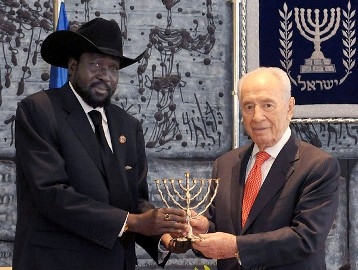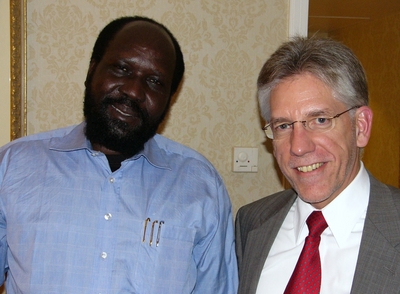It's not every day that the leader of a brand-new country makes his maiden foreign voyage to Jerusalem, capital of the most besieged country in the world, but Salva Kiir, president of South Sudan, accompanied by his foreign and defense ministers, did just that in late December. Israel's President Shimon Peres hailed his visit as a "moving and historic moment." The visit spurred talk of South Sudan locating its embassy in Jerusalem, making it the only government anywhere in the world to do so.
 Salva Kiir and Shimon Peres with a menorah. |
This unusual development results from an unusual story.
Today's Sudan took shape in the nineteenth century when the Ottoman Empire controlled its northern regions and tried to conquer the southern ones. The British, ruling out of Cairo, established the outlines of the modern state in 1898 and for the next fifty years ruled separately the Muslim north and Christian-animist south. In 1948, however, succumbing to northern pressure, the British merged the two administrations in Khartoum under northern control, making Muslims dominant in Sudan and Arabic its official language.
Accordingly, independence in 1956 brought civil war, as southerners battled to fend off Muslim hegemony. Fortunately for them, Prime Minister David Ben-Gurion's "periphery strategy" translated into Israeli support for non-Arabs in the Middle East, including the southern Sudanese. The government of Israel served through the first Sudanese civil war, lasting until 1972, as their primary source of moral backing, diplomatic help, and armaments.
Mr. Kiir acknowledged this contribution in Jerusalem, noting that "Israel has always supported the South Sudanese people. Without you, we would not have arisen. You struggled alongside us in order to allow the establishment of South Sudan." In reply, Mr. Peres recalled his presence in the early 1960s in Paris, when then-Prime Minister Levi Eshkol and he initiated Israel's first-ever link with southern Sudanese leaders.
Sudan's civil war continued intermittently from 1956 until 2005. Over time, Muslim northerners became increasingly vicious toward their southern co-nationals, culminating in the 1980-90s with massacres, chattel slavery, and genocide. Given Africa's many tragedies, such problems might not have made an impression on compassion-weary Westerners except for an extraordinary effort led by two modern-day American abolitionists.
 Charles Jacobs given the Boston Freedom Award in 2000 by Coretta Scott King "for his abolitionist efforts." |
Starting in the mid-1990s, John Eibner of Christian Solidarity International redeemed tens of thousands of slaves in Sudan while Charles Jacobs of the American Anti-Slavery Group led a "Sudan Campaign" in the United States that brought together a wide coalition of organizations. As all Americans abhor slavery, the abolitionists formed a unique alliance of Left and Right, including Barney Frank and Sam Brownback, the Congressional Black Caucus and Pat Robertson, black pastors and white Evangelicals. In contrast, Louis Farrakhan was exposed and embarrassed by his attempts to deny slavery's existence in Sudan.
 John Eibner meeting with Silva Kiir in 2006 in Paris. |
The abolitionist effort culminated in 2005 when the George W. Bush administration pressured Khartoum in 2005 to sign the Comprehensive Peace Agreement that ended the war and gave southerners a chance to vote for independence. They enthusiastically did so in January 2011, when 98 percent voted for secession from Sudan, leading to the formation of the Republic of South Sudan six months later, an event hailed by Mr. Peres as "a milestone in the history of the Middle East.".
 A ubiquitous sign before the January 2011 referendum: "Vote for separation to end slavery and underdevelopment." |
Israel's long-term investment has paid off. South Sudan fits into a renewed periphery strategy that includes Cyprus, Kurds, Berbers, and, perhaps one day, a post-Islamist Iran. South Sudan offers access to natural resources, especially oil. Its role in Nile River water negotiations offers leverage vis-à-vis Egypt. Beyond practical benefits, the new republic represents an inspiring example of a non-Muslim population resisting Islamic imperialism through its integrity, persistence, and dedication. In this sense, the birth of South Sudan echoes that of Israel.
If Kiir's Jerusalem visit is truly to mark a milestone, South Sudan must travel the long path from dirt-poor, international protectorate with feeble institutions to modernity and genuine independence. This path requires the leadership not to exploit the new state's resources nor dream of creating a "New Sudan" by conquering Khartoum, but to lay the foundations for successful statehood.
 A sign at the independence celebrations (edited for meaning, using the Arabic for guidance): "From today, our identity is South [Sudanese] and African, not Arab and Islamic. We are not the worst of Arabs but the best of Africans." |
For the Israelis and other Westerners, this means both helping with agriculture, health, and education and urging Juba to stay focused on defense and development while avoiding wars of choice. A successful South Sudan could eventually become a regional power and a stalwart ally not just of Israel but of the West.
Mr. Pipes (www.DanielPipes.org) is president of the Middle East Forum and Taube distinguished visiting fellow at the Hoover Institution of Stanford University. © 2012 by Daniel Pipes. All rights reserved.
Jan. 12, 2012 update: In the aftermath of the euphoric independence celebrations, news coming out of South Sudan is pretty bleak, Jeffrey Gettleman documents in "
South Sudan, born six months ago in great jubilation, is plunging into a vortex of violence. Bitter ethnic tensions that had largely been shelved for the sake of achieving independence have ruptured into a cycle of massacre and revenge that neither the American-backed government nor the United Nations has been able to stop.
The United States and other Western countries have invested billions of dollars in South Sudan, hoping it will overcome its deeply etched history of poverty, violence and ethnic fault lines to emerge as a stable, Western-friendly nation in a volatile region. Instead, heavily armed militias the size of small armies are now marching on villages and towns with impunity, sometimes with blatantly genocidal intent.
Feb. 2, 2012 update: If South Sudan offers opportunities to Israel, its going to war with Sudan would harm Israeli interests. Gavriel Queenann outlines the dangers for Arutz Sheva:
Conflict between South Sudan and North Sudan could have a direct impact on Israel, which is presently seeking to return a growing population of illegal immigrants from South Sudan to their country of origin. Earlier this week, Israel's Interior Ministry directed the National Immigration Authority to lay the groundwork to send refugees from South Sudan home on the grounds conflict in their home country was at end. Israel is offering amnesty and an assistance basket to South Sudanese who are in the country illegally who identify themselves and agree to return home by 1 April 2012. After that date, arrest and deportation will be the method used to return them to South Sudan. Should conflict war begin anew Jerusalem could face left-wing and international pressure not to deport them.
Feb. 24, 2012 update: Lawrence Solomon, executive director of Energy Probe, puts South Sudan in perspective in an article titled "Israel's gas diplomacy": He starts by noting how gas and oil finds in the Mediterranean Sea have changed Greek and Cypriot attitudes toward Israel, then observes:
Israel views Cyprus and Greece as part of the "Western arc" of its periphery strategy, along with other European countries such as Christian Romania and Bulgaria, and Muslim Albania, which has been a standout defender of Israel in the United Nations. Israel now also has allies to the east, such as Georgia and Azerbaijan in Central Asia. And as part of its southern diplomacy, Israel recently established an East African alliance with predominantly Christian Kenya, Tanzania, Ethiopia and South Sudan designed to fend off Iran and Islamist terrorism. Israel's stock in East Africa is particularly high because of its role in gaining independence for South Sudan, the world's newest state.
Solomon concludes with a big-picture view of Israel's geopolitical circumstances:
Focus on Israel and it appears to be a tiny isolated country surrounded by a sea of hostile Arab nations. Zoom out, though, and it is the Arab nations that are revealed to be isolated, increasingly surrounded by age-old adversaries, most of which have growing ties to Israel.
July 9, 2021 update: The 10th anniversary of South Sudan's independence offers little opportunity for joy. The hopes of 2011 have long ago been dashed. One can only hope that the second decade proves more fortunate.
